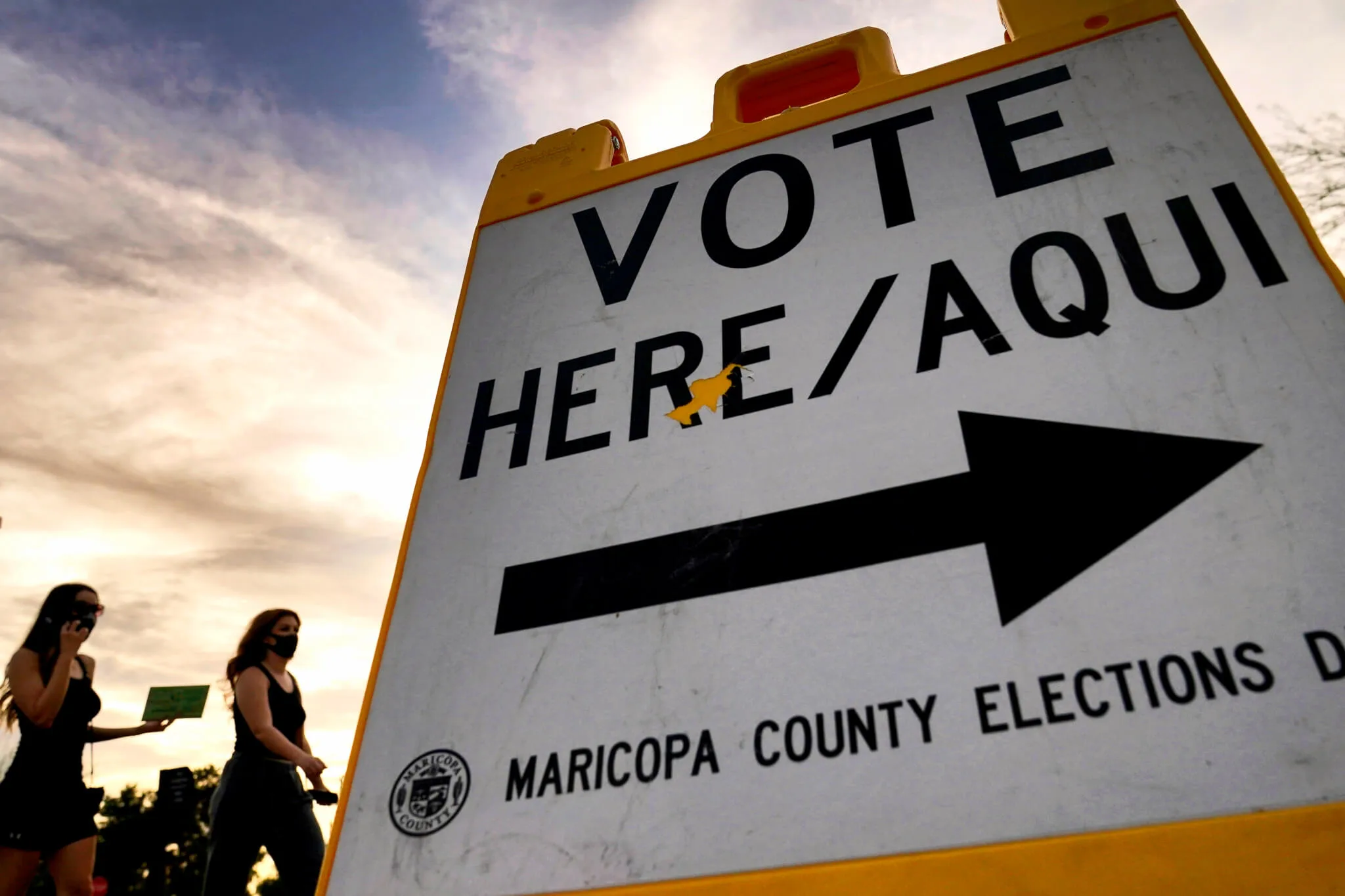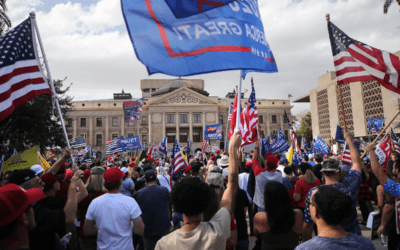
FILE - Voters deliver their ballots to a polling station on Nov. 3, 2020, in Tempe, Ariz. Texas has become the latest state where Republicans have rolled back access to voting methods that soared in popularity during last year’s pandemic presidential election. The Texas bill, expected to be signed soon by Gov. Greg Abbott, follows similar legislation this year in Arizona, Florida, Georgia, Iowa and some other GOP-controlled states. (AP Photo/Matt York, File)
Politicians aren’t the only things on the ballot this November.
Arizona voters will find a series of 10 propositions near the end of their ballot this year that they’ll be asked to weigh in on. These measures are a constitutionally-protected form of direct democracy, where Arizonans can bypass the legislature and governor to enact popular legislation.
In the November election, Arizonans will be able to vote to deliver funding to rural fire departments, give tax breaks to veterans with disabilities, and even defend the ballot measure process itself, among other things.
Only two of the ballot measures this year were brought to the ballot by voters, the remaining eight came from the Republican-led legislature.
Every ballot measure that would make passing ballot measures more difficult or require additional steps for voting was approved by the Republican-led legislature and not sent to the ballot by Arizona voters.
Here’s what will happen if you vote ‘Yes’ on each ballot measure this year:
Prop 128
This would amend the Arizona Constitution to give the state legislature or Arizona Supreme Court the power to amend or repeal voter-approved ballot measures.
In 1998, Arizonans approved the Voter Protection Act, which prohibited the legislature from amending or repealing voter-approved ballot initiatives and referendums.
If Prop 128 were to pass, it would result in a hit to direct democracy in Arizona, taking power away from the voters to enact legislation and delivering it to the state government.
This proposition was not placed on the ballot by voters. It was introduced in the legislature by Republican State Sen. Vince Leach, and passed in both the state Senate and state House of Representatives along party lines.
Prop 129
If approved by voters, this would allow Arizona judges to void ballot measures if they cover more than one subject.
The “single-subject” rule could make it more difficult for Arizonans to pass legislation through ballot measures. Arizonans are given the right to enact laws independent of the legislature.
This proposition was not placed on the ballot by voters. It was introduced in the legislature by Republican State Rep. John Kavanagh, and passed in both the state Senate and state House of Representatives along party lines.
Prop 130
Prop 130 would amend the Arizona Constitution to offer a property tax exemption for veterans with disabilities, widows, and widowers.
It would also allow the Arizona legislature to decide the qualifications and tax exemption amount for these groups.
This ballot measure was not placed on the ballot by voters. It was introduced in the state Senate and passed by a vote of 17-12. It passed unanimously in the state House.
Prop 131
This would create a new political office in Arizona. It would create the position of lieutenant governor. They would be picked by a gubernatorial candidate and run on the same ticket in elections.
The role of lieutenant governor would be to take on duties of the governor if the governor is not in Arizona or is incapacitated. They would also ascend to office if a sitting governor died, resigned, or was removed from office.
Right now, the secretary of state is next in line for the office of governor in Arizona. Arizonans have twice rejected lieutenant governors – once in 1994 and again in 2010.
The office of lieutenant governor would take effect starting with the 2026 election.
Prop 132
Prop 132 is a ballot measure that would make passing some ballot measures more difficult in Arizona.
Any ballot measure that would enact a tax increase would require a supermajority of 60 percent to pass instead of the 50.01% simple majority.
Arizonans notably passed Prop 208 in 2020 by a margin of 51.75% to 48.25% before it was overturned by the Arizona Supreme Court.
This ballot measure was brought to the ballot by the Republican-led legislature. It passed the state Senate by a vote of 16-12 and the state House by a vote of 31-27.
Passing Prop 132 would make it significantly more difficult for Arizonans to pass tax increases to fund popular programs or institutions.
Prop 209
If passed, this would cap interest rates for medical debt at 3 percent, down from 10 percent.
It would shield more Arizonans’ money from debt collectors and debt collection agencies.
This was brought to the ballot through signature collections from voters. Over 300,000 valid signatures were collected.
Prop 211
The “Voters’ Right to Know Act,” aims to shine a light on the use of dark money in Arizona politics.
It would require any group that spends $50,000 or more in a statewide campaign, or $25,000 in any other campaign, to reveal the identity of anyone who contributes more than $5,000.
The Republican Party of Arizona opposes the ballot measure, claiming that giving voters information on who funds political campaigns in the state is an infringement on free speech.
Arizona voters brought this measure to the ballot. Almost 400,000 signatures were gathered.
Prop 308
Proposition 308 would allow all Arizona students, regardless of immigration status, to receive in-state tuition.
This will apply to students who spent two years, as well as graduated from, a public, private, or homeschool in Arizona.
The measure was passed in the state Senate by Democrats and three Republicans, and in the state House by Democrats and four Republicans.
Prop 309
This would impose additional voter identification for early ballots. It would require people to include a state-issued ID number or the last four digits of their Social Security number in addition to their birth date and signature.
Prop 309 would add another hurdle to a system which hasn’t shown any systemic issues with fraud. Arizonans are already required to prove their identity when registering to vote.
Voters did not send this proposition to the ballot. It was approved in the state Senate by a vote of 16-12 and in the state House by a vote of 31-26, with Republicans voting in favor and Democrats against.
Prop 310
Prop 310 would increase sales tax by 0.1% for 20 years and put that money into something called the Fire District Safety Fund.
The purpose of the Fire District Safety Fund is to give money to rural fire districts across the state.
It was introduced in the state legislature by Republican Sen. Paul Boyer. It was approved in the state Senate by a vote of 25-3 and in the state House by a vote of 34-25.
Despite a Republican introducing the measure and bipartisan support in the legislature, the Republican Party of Arizona is advising voters to vote against funding rural fire districts.
Looking for the latest Arizona news? Sign up for our FREE daily newsletter.
Support Our Cause
Thank you for taking the time to read our work. Before you go, we hope you'll consider supporting our values-driven journalism, which has always strived to make clear what's really at stake for Arizonans and our future.
Since day one, our goal here at The Copper Courier has always been to empower people across the state with fact-based news and information. We believe that when people are armed with knowledge about what's happening in their local, state, and federal governments—including who is working on their behalf and who is actively trying to block efforts aimed at improving the daily lives of Arizona families—they will be inspired to become civically engaged.


He said what? 10 things to know about RFK Jr.
The Kennedy family has long been considered “Democratic royalty.” But Robert F. Kennedy, Jr.—son of Robert F. Kennedy, who was assassinated while...

Here’s everything you need to know about this month’s Mercury retrograde
Does everything in your life feel a little more chaotic than usual? Or do you feel like misunderstandings are cropping up more frequently than they...

Arizona expects to be back at the center of election attacks. Its officials are going on offense
Republican Richer and Democrat Fontes are taking more aggressive steps than ever to rebuild trust with voters, knock down disinformation, and...

George Santos’ former treasurer running attack ads in Arizona with Dem-sounding PAC name
An unregistered, Republican-run political action committee from Texas with a deceptively Democratic name and ties to disgraced US Rep. George Santos...





